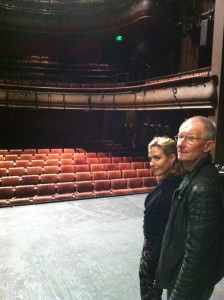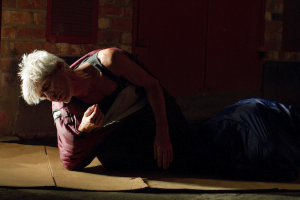
Happy Days will be staged at the Young Vic London from 23rd January-8th March 2014, with Juliet Stephenson playing the role of Winnie. Credit: Young Vic
Looking ahead to the 2014 calendar shows that it will be another busy year for Beckett productions in the UK and Ireland. So far, January has already set the pace with Saturday seeing the end of the sold out Royal Court run of Not I/Footfalls/ Rockaby featuring Lisa Dwan, while Tom Owen performed as Krapp at the Rose Theatre Kingston on Monday 13th January . Last Thursday and Friday also saw Company SJ perform Act Without Words II as part of the Abbey Theatre’s The Theatre of Memory Symposium.
More Beckett performances are on their way as early as this week with Juliet Stephenson taking on the role of Winnie in an eagerly anticipated production of Happy Days at the Young Vic directed by Natalie Abrahami. Demand has seen this production already extend its run from 23rd January-8th March.
After a two week break Lisa Dwan returns to her acclaimed trilogy directed by Walter Asmus, though this time the production moves to the Duchess Theatre in London’s West End for a two week run from 3rd-15th February. Later in the year Dwan and the Royal Court will embark on a UK, Irish and International tour. The UK dates announced so far include: 9th-13th September-Arts Theatre Cambridge, 16th-20th September-Birmingham Repertory Theatre and 23rd-27th September-The Lowry Salford.
Productions of Waiting for Godot and Endgame are also planned for the Arcola Theatre, London (7th May-14th June) and the Wilde Theatre, Bracknell (5th-8th June) respectively. Happy Days will also tour to various venues around Ireland courtesy of the Godot Theatre Company.
Richard Wilson, renowned for his role of Victor Meldrew in One Foot in the Grave, returns to the Beckett stage having previously performed as Vladimir in Waiting for Godot at the Traverse in Edinburgh and Royal Exchange Manchester. This time he performs in Krapp’s Last Tape at the Crucible Theatre Sheffield from 25th June-19th July.
As usual Enniskillen will be transformed into Beckett Town when the Happy Days Enniskillen International Beckett Festival takes its summer residency. This year’s multi-arts festival takes place from 31st July-10th August and will no doubt once again provide a vibrant international perspective on Beckett, with global productions once again expected to descend upon Enniskillen.
Beckett month in Ireland will continue with the annual TCD Samuel Beckett Summer School, from 10th-16th August, providing a rich mix of scholarship, performance and talks.
This extensive list does not even take into account the numerous productions happening internationally such as Godot’s extended run on Broadway with Ian McKellan and Patrick Stewart, Barry McGovern in I’ll Go On, Mouth on Fire’s productions in Hyderabad and Pan Pan’s All That Fall touring in Sydney and Brisbane.
If you have a Beckett production coming up, please let us know and we’ll add it to the list!
Further productions announced since this original post:
Company SJ will present its two site-specific Beckett pieces, Rough For Theatre I and Act Without Words II as the centre piece for the exhibition: “Godot on Rubble; Beckett and Catastrophe”. These performances will run from 10th-14th June at the Tsubouchi Memorial Theatre Musuem, Waseda University, Japan, while the exhibition will be held from April-July 2014 at Waseda University.






